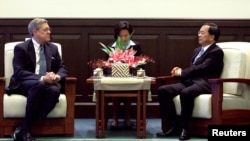The U.S. government would find it easier to exchange high-level visits with diplomatically isolated Taiwan after approval of a new congressional bill, but experts say the legislation will just turn Taiwan into a bargaining chip in Sino-U.S. relations.
If U.S. President Donald Trump signs the Taiwan Travel Act – and analysts say little is holding him back – the advisory bill that passed the Senate February 28 will give a legal basis to any uptick in official visits between the two sides.
China, which sees self-ruled Taiwan as part of its territory rather than a state entitled to foreign relations, has protested to the United States against the Act.
Because the bill is advisory rather than binding, Washington could use it selectively, analysts say. Trump, for example, might send a department head to Taipei to put pressure on China over an unrelated issue, and hold off allowing any visits when trying to get along with Beijing, they say.
“It would primarily be symbolic, a signal of U.S. government unhappiness with some of China's policies,” said Denny Roy, senior fellow at the East-West Center think tank in Honolulu. “The argument against it is that it would irritate China, and the argument for it is also that it would irritate China.”
Call in Congress for stronger Taiwan ties
The bill says U.S. officials “at all levels” should per government policy travel to Taiwan for meetings with Taiwanese counterparts and let Taiwanese officials enter the United States “under respectful conditions and to meet with U.S. officials,” according to the Senate’s website. The Act encourages military exchanges, among others.
Members of the House of Representatives had pushed for the bill since last year to support Taiwan, which co-sponsoring Congressman Ed Royce called “a strong friend and critical partner to the United States.”
Republican Party lawmakers generally advocate Taiwan ties. They now control both houses of Congress, making the Act easy to pass, said Raymond Wu, managing director of Taipei-based political risk consultancy e-telligence.
U.S. officials have visited Taiwan six times since the two sides cut formal ties in 1979 as Washington established diplomatic relations with Beijing. When a Taiwan president visits the United States, Washington allows layovers of just 24 to 48 hours and bars formal meetings with federal officials.
The United States prizes economic ties with China but remains a staunch supporter of democratic Taiwan as one of several West-leaning Asian governments.
The Act omits any requirement for high-level visits, leaving it open to the discretion of the president.
“The Taiwan Travel Act provides the legal basis upon which high-level visits between the governments can happen, but that does not necessitate that it must happen,” Wu said. “If, for example, the relations between China and the U.S. turn sour, then this may become an option.”
Anger in Beijing
Beijing protested March 1 to the United States, calling the Act a violation of Washington’s consent to a “one-China” policy. Washington gives no formal diplomatic recognition to Taipei.
China and Taiwan have been separately ruled since the Chinese civil war of the 1940s, when the Nationalists fled the mainland and based their government in Taiwan. China insists on eventual unification, by force if needed, despite widespread opposition among Taiwanese.
China condemns overtures abroad that cast Taiwan as a state with the right to foreign diplomacy.
The Communist leadership will “make sure” the bill allows no pickup in U.S.-Taiwan visits but cannot stop Trump from signing it into law, said Alex Chiang, international relations professor at National Chengchi University in Taipei.
“If something comes up, and the meeting is required, and then probably they will meet, but I don’t think it will become a routine or regular meeting,” Chiang said.
The bill stands to hurt chronically strained China-Taiwan ties as well as Sino-U.S. relations, said National Chengchi University’s international affairs college vice dean Huang Kwei-bo.
Beijing resents Taiwan President Tsai Ing-wen for refusing to see both sides as part of China. It has used a series of economic and diplomatic measures to vent against Taiwan since Tsai took office in mid-2016.
“For Taiwan, the chance of being a bargaining chip of the U.S. administration and encountering greater diplomatic isolation caused by China will increase, while mutual trust between the U.S. and China will decrease once the U.S. administration has hinted or considered the application of the Act,” Huang said.
China would lash out especially hard at Taiwan if it invites a U.S. leader and take on the United States if it either initiates a visit or eagerly accepts an invitation, said Yun Sun, East Asia Program senior associate at the Stimson Center think tank in the United States.
“We know that the Chinese speculate that Trump loves transaction and Trump at each time has one priority,” Sun said. “And I think most likely they’re going to speculate that Trump wants something in return, or wants to see some compromise or concessions out of Beijing.”




